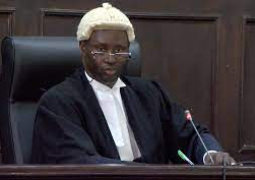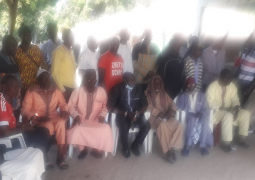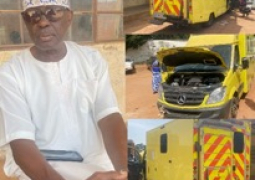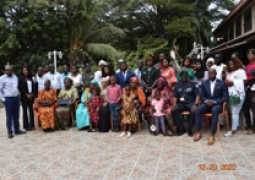
President Barrow emphasised that the project reflects his administration’s dedication to equitable development, ensuring that even the most remote areas are accessible and integrated into the national transport network.
He noted that improved road infrastructure will not only ease mobility but also stimulate economic growth, enhance access to essential services, and uplift the quality of life for citizens.
The proposed expansion is expected to span key regions, linking towns and villages, and transforming the country’s transport landscape. The President reaffirmed that his government remains resolute in its mission to modernise infrastructure and deliver tangible progress to the Gambian people.
President Barrow made these remarks in Salikenne, Central Badibou, on the second day of his ongoing constitutionally required nationwide tour.
He added: “In addition to the ongoing road construction projects across the country, my government is working to build a further 700 kilometres of roads by next year.”
Barrow also highlighted the positive impact of the newly constructed hospital in the area. He recalled that when plans were initially made to build the hospital in the village, some individuals opposed the idea due to political differences. “I told them, they are Gambians and I was elected by Gambians. Development should not be hindered by political affiliation,” he stated.
He noted that the community had long appealed for improved road infrastructure, and in response, his government has delivered on that promise. He urged residents to rally behind the government so that, together, they can work towards the advancement of the nation.
Addressing broader national issues, President Barrow remarked: “Former President Jammeh cannot return to the country if he chooses not to. My focus is singular — to rapidly develop this country and bring it in line with other developed nations through tangible infrastructural progress.”
He announced that the newly built hospital has been named in honour of Sheriff Mustapha Dibba, recognising his legacy and contributions to the nation. On electrification, President Barrow pledged that every village currently without electricity will be connected to the national grid by 2026.
He further revealed that while 1,500 kilometres of roads have already been constructed, an additional 700 kilometres is planned, with the North Bank Region among the key beneficiaries. “The Gambia of today is vastly different from yesterday, especially in terms of infrastructure and development,” he concluded.
For his part, the minister for Agriculture, Hon. Demba Sabally, emphasised the importance of the nationwide tour. He noted that the government has made significant interventions in the agricultural sector across the region.
Minister Sabally announced that four newly acquired tractors have been distributed in Central Badibou. He further stated that in both Lower and Central Badibou, the government has ploughed 345 hectares of farmland free of charge. Additionally, over 3,000 bags of fertiliser have been distributed to farmers through various government-led projects.
"In Kinteh Kunda, 45 hectares of farmland were ploughed at no cost to farmers, while in Saba, 34 hectares received similar support. Njawara Kunda and Badibou Gunjur also benefited from extensive ploughing, with farmers receiving seeds and fertilisers free of charge through government initiatives."
In Salikenni alone, more than 70 hectares was ploughed by the government, all part of a broader effort to strengthen the country’s farming sector. Minister Sabally added that numerous villages in Lower Badibou, as well as Central Badibou, have received seed support.
He revealed that the Ministry’s projects will soon commence work on an additional 45 hectares in Suwareh Kunda. “To reduce post-harvest losses faced by farmers, warehouses have been provided in Minteh Kunda, Salikenne, and Banni,” he divulged.
Minister Sabally also shared plans for the construction of multiple gardens in the area under the government’s broader initiative, aimed at empowering women through gardening. "Furthermore, two pastures have been established to support livestock, and several cattle drinking points have been constructed to enhance animal welfare."
The Alkalo of Salikenne village, Baba Marigo Dibba, expressed his gratitude to President Barrow for undertaking the nationwide tour. He thanked the President for the construction of a hospital in the area, while also appealing for the facility to be fully equipped and staffed with adequate healthcare personnel.
He noted that over 100 pregnant women have already been delivered of their babies at the hospital, which serves not only Salikenne but also neighbouring communities stretching as far as Farafenni. The Alkalo also extended his appreciation to President Barrow for the newly constructed road, which has greatly improved access to the village.
Additionally, he urged the President to facilitate the deployment of NAWEC personnel to the area, to ensure residents can easily purchase NAWEC cashpower and access electricity services without difficulty.
As part of the government's ongoing efforts to empower Gambian women, a cheque of 2.8 million dalasis was earmarked for distribution to various women's groups through the minister for Gender.
Farafenni meeting
Chief Alhagie Mustapha Dibba praised the unprecedented development taking place nationwide, citing improvements in road networks, the health sector, and the provision of community ambulances.
He highlighted ongoing construction projects at the University of The Gambia and the timely distribution of fertiliser to farmers. Urging residents to rally behind President Barrow, Chief Dibba expressed confidence in the president’s intentions and pledged massive support in the upcoming December 2026 presidential election.
Chairman Papa Tunkara of the Kerewan Area Council outlined key achievements in the region, including the completion of the Sarra Kunda market and developments in Madina Serigne Mass. He noted the acquisition of two waste collection trucks for Barra and Farafenni, despite limited revenue. Chairman Tunkara appealed to the president for assistance in providing electricity and water to Jamagen, upgrading the Farafenni stadium with fencing and Bahamas grass, and constructing the Saba Sanjal Road.
Lady Councillor Jully Sowe expressed gratitude for the president’s support to women, particularly in the provision of storage facilities to preserve agricultural produce.
Regional Governor Lamin Saidykhan emphasised the significance of the tour, calling on the community to redouble their efforts in supporting the president’s development agenda. He encouraged young people to register and vote in the 2026 elections, citing the tangible progress made under Barrow’s leadership.
In his address, President Barrow thanked the people of Farafenni for their enthusiastic welcome. He reiterated that the development initiatives underway are part of the promises he made to Gambians. “There is no hospital in the world where all medication is free—not even in developed countries,” he remarked, underscoring the challenges of governance and the importance of realistic expectations.
The president explained that the tour serves as a platform to engage directly with citizens, listen to their concerns, and tailor government responses accordingly. “As your servant, I am committed to addressing your issues and working towards improving this country,” he declared.
He called for unity and urged Gambians to move beyond divisions and character attacks. Reflecting on past skepticism surrounding the OIC Road project, President Barrow noted that critics had doubted its feasibility, yet it has now become a reality. “Everything you said, I am working on it day and night. What you didn’t have in the previous government, you will have in mine,” he assured.
President Barrow concluded by expressing his desire to leave behind a legacy of lasting development. “I will eventually leave government, but I want to ensure that when I do, I leave a legacy that will endure for generations.”
At the Farafenni meeting, Minister Sabally also highlighted the numerous development projects championed by the government in the area, all aimed at supporting the nation’s farming sector and addressing the challenges farmers have long faced.





